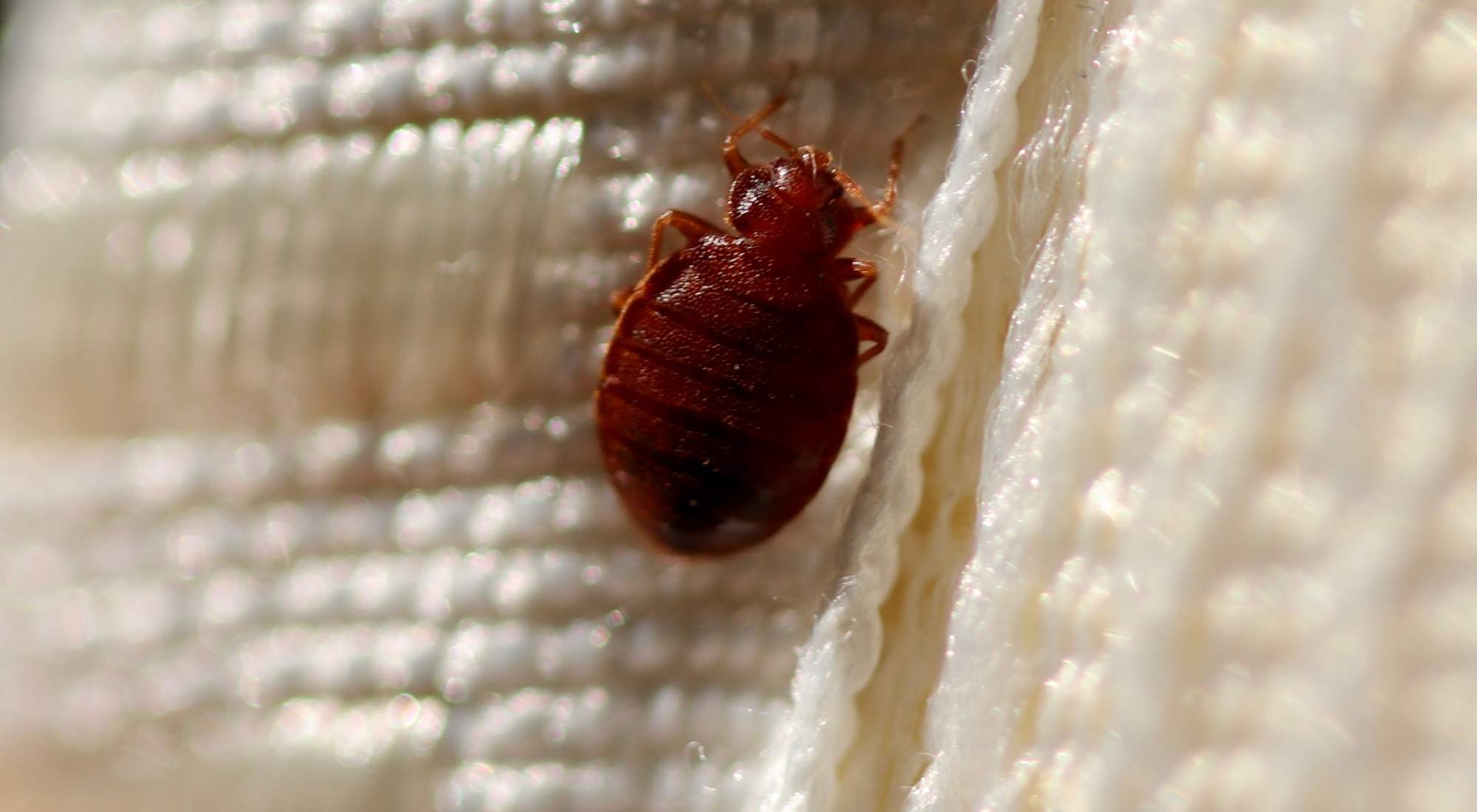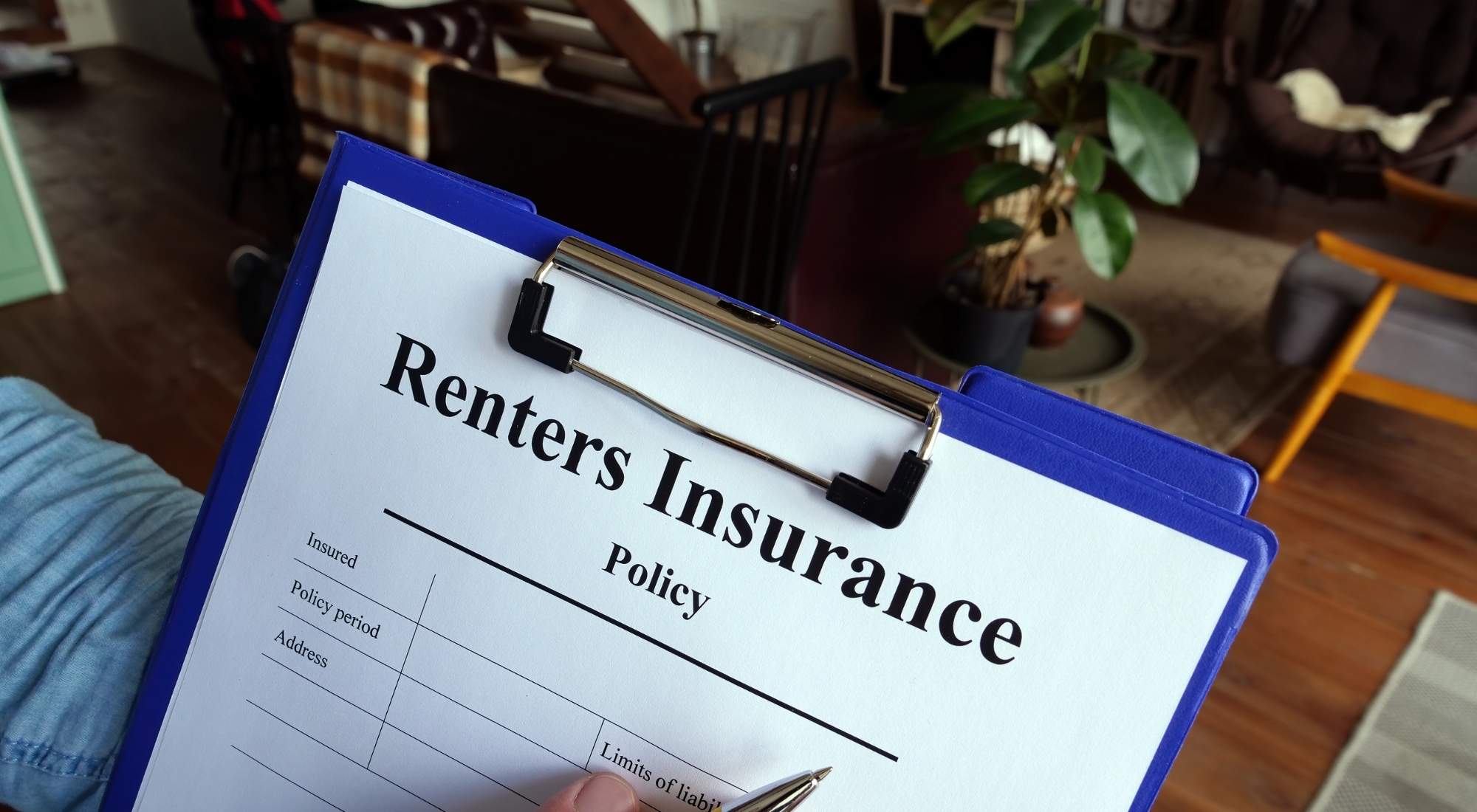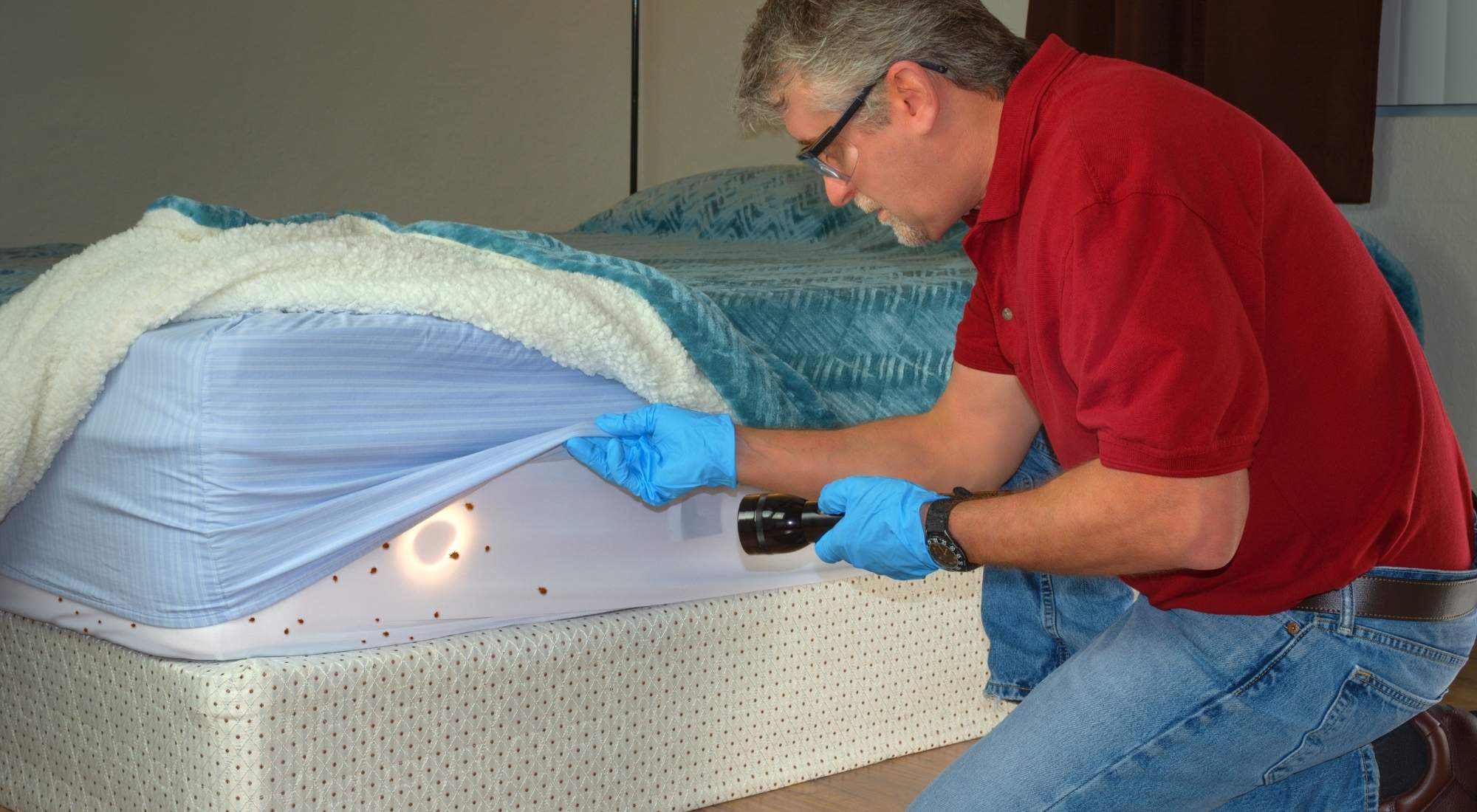A bed bug infestation is the last thing you hope to deal with as a renter.
But if you happen to be caught in that unfortunate circumstance, you may wonder how to take care of the remediation.
Is the landlord responsible for the costs incurred, or will your renters insurance cover the damages?
It’s important to know the specifics of a renters insurance policy to know if you’ll be protected if bed bugs come knocking.
In this guide, we’ll answer questions like:
- Does renters insurance cover bed bug infestations?
- What are renters insurance options for bed bug coverage?
- Who is responsible for getting rid of bed bugs in a rental?
Table of Contents
- Does Renters Insurance Cover Bed Bugs?
- 2 Reasons Renters Insurance Generally Doesn’t Cover Bed Bug Infestation
- Renters Insurance Options for Bed Bugs
- When You Rent, Who Is Responsible for Getting Rid of Bed Bugs?
- Pure Environmental Offers the Best Bed Bug Treatment Around
Does Renters Insurance Cover Bed Bugs?
No, renters insurance doesn’t usually cover bed bug infestations.
Renters insurance is generally reserved to handle issues and damage from sudden disasters like fires or storms, and bed bugs don’t fit into that category.
Bed bugs are not only annoying, but they can cause damage to personal property and irritation to your skin. When dealing with a bed bug infestation, renters may have expenses related to:
- Extermination and bed bug remediation
- Mattress replacement
- Dry cleaning
- Other cleaning expenses
- Hotel bills (if vacating the premises is necessary during remediation)
- Doctor bills or co-pays for medical visits
- Medication
Unfortunately, none of those costs are generally covered under a tenant’s renters insurance. Bed bugs can cost an average of $1750 to eradicate, meaning that you may be stuck with a hefty bill without any chance of remuneration.

2 Reasons Renters Insurance Generally Doesn’t Cover Bed Bug Infestations
Because of the nature of renters insurance, bed bug infestations are generally not considered an emergency or weather disaster.
#1: Renters Insurance Is Meant to Cover Unexpected Disasters
What exactly is meant by unexpected disasters?
The first thing that may come to mind is a tornado or hurricane, but renters insurance usually covers losses caused by other unexpected occurrences like:
- Theft
- Water damage
- Fires; and
- Natural disasters including:
- Floods
- Tornados; and
- Hurricanes
Because ridding a home of infestations of bed bugs and other rodents like mice and rats are considered part of home maintenance, most renters insurance policies exclude those situations from coverage.
One Exception to This Rule
Though rare, an exception to this rule may be made if the bed bug damage results from a covered peril.
In insurance, a covered peril refers to an event the insurance company agrees to cover if you file a claim.
Covered peril includes many of the disasters that we’ve listed above, including:
- Lightning strikes
- Fire
- Windstorms
- Theft
- Vandalism
- And more
If the bed bugs are a result of a covered peril, it may be covered under a standard renters insurance policy.
#2: Bed Bugs Are Considered Preventable
Pest control is an area of regular home maintenance that tenants are usually responsible for, though a landlord may be responsible for that maintenance in some situations. Preventing bed bugs falls under the same category as preventing other pests like cockroaches, mice, and other rodents.
Like these other pests, bed bugs are considered preventable and thus are not covered by renters insurance.
The Best Ways to Prevent Bed Bugs
If renters insurance is not going to cover damage due to bed bugs, a renter’s best bet is to prevent them so they don’t become a problem in the first place.
Follow these tips to keep a bed bug infestation from becoming an issue:
- Wash and change your bed linens regularly.
- Encase your mattress and box springs in a protective cover.
- If you want to use second-hand furniture, inspect it thoroughly before bringing it into your home.
- When traveling and using hotels, inspect the bed, mattress, and other furniture carefully using a bright light.
- Avoid putting clothes in dressers or on the bed when staying in a hotel.
- Inspect your luggage carefully when returning home from a hotel stay.
- Vacuum often.
- Regularly declutter.
- Wash clothes and linens in the hottest water appropriate for the type of fabric.
If you end up with a bed bug infection, you may be tempted to try and wipe them out yourself with an over-the-counter pesticide or DIY treatment. This is not recommended because pesticides and DIY treatments are generally not effective and may end up costing you more money and trouble than it’s worth.
To get rid of bed bugs with confidence, it’s best to use a trusted exterminator. Pure Environmental eliminates bed bugs with a process that uses convection to force heat into beds, furniture, and other surfaces where bed bugs reside. This process kills bed bugs and their eggs wherever they are hiding.
Renters Insurance Options for Bed Bugs
Though most insurance companies do not have renters insurance policies that cover bed bugs, it may be possible to find a smaller insurance company that does provide bed bug coverage.
Another option that an insurance company may provide is an endorsement, also known as a “rider”, which acts as an add-on to their policy.
If a company offers this add-on, the renter would pay an additional fee that would cover costs related to:
- Remediation of bed bug infestation in the rental property
- Sealing off neighboring units to prevent further infestation
- Disposal of damaged and infested property
- Cleaning and sanitizing the rental
- Replacing damaged belongings
- Additional living expenses if it’s impossible to live in the infested residence
In the end, the best thing to do would be to check with your insurance agent with specific questions about bed bug coverage or do some research on your own to find a company that may provide a “rider” or add-on policy.

When You Rent, Who Is Responsible for Getting Rid of Bed Bugs?
In some cases and some states, the landlord may be responsible for taking care of the bed bug infestation.
Laws vary by state, so a renter would be well-served to know the laws of their state and their rights as a tenant.
Bed Bug Laws Vary by State
Many, but not all states have bed bug laws.
For example, in Florida, the landlord is “required to take reasonable steps to exterminate bed bugs within a rental property.”
In New Hampshire, the landlord must cover remediation costs but may “recover those costs if the tenant is responsible for the infestation.”
In Colorado, the landlord is responsible for the extermination, but the tenant must cover the costs associated with relocation or replacing damaged personal property
To know the law of your state and how it may affect you if you end up with an unfortunate bed bug infestation, check this listing provided by the National Pest Management Association.
If a renter lives in a state where the landlord is to be held responsible, the tenant usually is required to report the infestation promptly and agree to accommodate the exterminator by cleaning up clutter or evacuating the premises during treatment.
In the same way, the landlord should respond to the bed bug notification quickly and give proper notice of the exterminator’s arrival for treatment.
In the worst case, if the landlord and tenant can’t agree on who is responsible for the extermination expenses, the renter may need to consult an attorney.

Your Rights as a Tenant Regarding Bed Bugs
Ever heard of “implied warranty of habitability?”
It’s a legal concept that means a landlord must provide a property that is habitable, including things like:
- Heat
- Sound floors and walls
- Safe drinking water; and
- No rodents
Though this legal concept is in effect, it doesn’t mean that a landlord will pay the costs to get rid of bed bugs if there’s a valid reason to believe that the renter is responsible for the infestation.
For example, if you are a new renter and you and several of your adjacent neighbors are all experiencing bed bug problems, it will be difficult for the landlord to prove that you are to blame.
However, if you’ve been renting a home for several years, and suddenly, bed bugs appear just after your two-week vacation, it’s a little easier to prove that you were the one responsible for bringing them into the home. In that case, you’ll likely be the one who needs to foot the extermination bill.
If you have a bed bug infestation and end up paying the costs yourself, you want to be sure that the remediation is thorough and that the bed bugs are gone for good.
Choosing Pure Environmental for bed bug remediation will give you the peace of mind that comes with experience and trusted techniques. We eradicate bugs with a single treatment that is environmentally friendly without the use of chemicals.
Your Landlord May Be at Fault
In some cases, the landlord may be responsible for the expenses associated with exterminating bed bugs.
Renters should check their lease and know the laws of their state to be sure.
In states like Florida, Maine, and New York, landlords are required to exterminate bed bugs if they are in your apartment.
A landlord may be responsible for paying for remediation if bed bugs were found in a common area of the apartment complex and it was reported but the landlord did nothing about it. If the bed bugs begin to cause issues for other tenants, the landlord may be responsible to foot the bill.
Pure Environmental Offers the Best Bed Bug Treatment Around
Pure Environmental isn’t your typical exterminator and doesn’t attempt to eliminate bed bugs with pesticides and chemicals.
We believe the most effective way to eradicate bed bugs is with a process called Thermal Remediation.
We use special heaters, fans, and a convection process to distribute heat throughout the area. With this process, heat penetrates …
- Beds
- Furniture
- Electronics
- Wall voids; and
- Clothing
… and heat probes are used to monitor temperatures to guarantee complete extermination.
The entire process can take from six to ten hours, so you can leave home after breakfast and return in time for dinner. And not only will the heat kill the bed bugs, but it will also get rid of bacteria, viruses, and other allergens.
Whether your renters insurance covers your bed bug infestation or you’re counting on the landlord to take care of the problem, look to Pure Environmental to take care of the issue thoroughly and safely.
Call or contact us for a free estimate.
Recent posts
- Home Insurance During Renovations: What Is Covered and What To Know Before Getting Started
- Mitigation and Restoration: Understanding the Difference Between the Two and Why They’re Both Necessary
- Should You Stay or Should You Go? Know When To Walk Away From a House With Mold
- How To Get Rid of Weed Smell: Top Tips To Help Cannabis Users and Growers Keep Their Homes Smelling Fresh and Clean
- HVAC System Longevity and Understanding When It’s Time To Replace Yours
